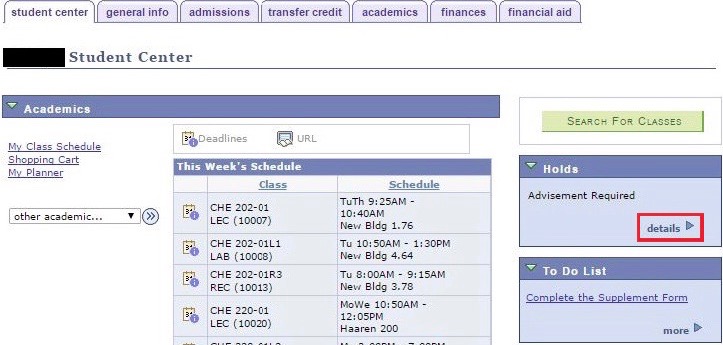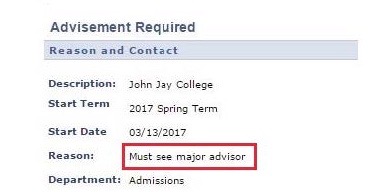Emergency Services Administration Major Resources
Here you will find:
- Key information about your major
- How and when to meet with your major advisor
- Planning tools that will help you track your progress in the major
- Ways to explore career opportunities related to the ESA major
Take a few moments to look at the information below. It will help you plan effectively and avoid surprises during your studies at John Jay. Please visit the Department of Security, Fire & Emergency Management website for information, resources, and opportunities!
ESA Requirements
You are responsible for the major requirements that were in effect when you declared the major. To confirm the requirements you should be following, go to the Undergraduate Bulletin for that academic year. For example, if you declare the Emergency Services Administration major in Fall 2017 or Spring 2018, you would click on the 2017-2018 Undergraduate Bulletin. If you declared the major and then left the College for more than one full semester, you’re responsible for the major requirements in effect when you return, if they have changed. Not sure when you declared the major? Find out here.
Below, find the Undergraduate Bulletin that was in effect when you declared the major.
- 2024-2025 Undergraduate Bulletin - ESA
- 2023-2024 Undergraduate Bulletin - ESA
- 2022-2023 Undergraduate Bulletin - ESA
- 2021-2022 Undergraduate Bulletin - ESA
- 2020-2021 Undergraduate Bulletin - ESA
- 2019-2020 Undergraduate Bulletin - ESA
- 2018-2019 Undergraduate Bulletin - ESA
- 2017-2018 Undergraduate Bulletin - ESA
No ESA major courses can be used to fulfill your General Education Requirements. Refer to the General Education Requirements for more information on meeting these requirements.
Major Advising
Professor Paul Kearns (pkearns@jjay.cuny.edu) is the ESA major coordinator for Fall 2024 and Spring 2025.
Please contact him if you need ESA major advising or have questions about the major.
ESA students who would like major advising during Summer session (June 3- August 27) 2024 can email Professor Paul Kearns (pkearns@jjay.cuny.edu).
Sophomores with 45-59 credits may have a hold on their registration. The hold will be removed when they have a major advising appointment with Professor Paul Kearns (pkearns@jjay.cuny.edu). This discussion will encourage wise planning and allow students to ask any questions they may have about the major. How do you know if you have a major hold? Go to CUNYfirst and complete the following steps:
- Check the Holds box of your CUNYfirst Student Center. If "Advisement Required" appears, click on “details.”

- Click on “Advisement Required.”

- See which type of advisement you need. If you must see a major advisor, then make a major advising appointment following the steps preferred by this department.

.
Plan Ahead: Graduate on Time
You will choose one of the following specializations:
- Fire Services
- Emergency Medical Services
- Emergency Management
Note: You will take five courses toward your specialization. See the Undergraduate Bulletin for complete lists of specialization courses.
In addition, keep the following guidelines in mind:
- Take ESA 101, FIS 101, and PAD 101 (formerly PAD 140) early! These introductory courses provide a foundation for many courses in the major.
- Look at the complete list of major requirements, and keep an eye out for required prerequisites for course options that interest you. (For example, the SEC 378 Security Management Internship course has both SEC 210 and 211 as prerequisites.)
- Remember that you will need at least a 2.0 GPA in the major and at least a 2.0 overall GPA to graduate.
- DegreeWorks degree audit - Use this online planning tool to track your overall progress toward graduation. You will see which of your general education and major requirements are completed, in progress, or still needed. Refer to the DegreeWorks FAQs to better understand how to use this helpful tool. Note: Confirm the accuracy of your degree audit with a general advisor and with Professor Till (the ESA advisor).
- ESA Degree Completion Checklistpdf - Fill out this printable worksheet to keep track of which major requirements you have completed and which ones you still need.
- Sample Four Year Planpdf - See an example of how you could complete all your degree requirements (major, general education, electives) and graduate in four years! Remember that this sample plan shows just one possible way to combine your requirements. Transfer students in particular should work with advisors to determine a plan that works best for them.
A General Academic Advisor will confirm what general academic requirements you still need, make suggestions about smart course planning that will help you graduate without delays, discuss your interest in adding a minor or second major, inform you about opportunities such as study abroad, discuss general questions and concerns, and make helpful referrals. Visit the Academic Advisement Center's webpage for more information.
ESA and Careers
Talk with your major advisor about how the ESA major can help prepare you for a career in firefighting, emergency medical technology, emergency/service management, corporate emergency planning, and other fields. Listen to Professor Robert Till share really helpful details that will give you a good idea of whether this major is for you.
The Center for Career and Professional Development is also great resource for all questions related to job searches, internships, and career preparation. CCPD staff is available to meet individually with students and alumni in L72.00 New Building. To request a 45-minute counseling appointment, log on to John Jay Careers Online. 15-minute drop-in sessions are available all day Mon-Fri. (Stop by in person earlier the same day to schedule a drop-in session.)
To continue your academic preparation for emergency-related careers, consider John Jay’s Advanced Certificate in Emergency Management Studies. This program offers advanced instruction related to theory, legal structure, federal doctrine, and the practice of emergency management.
In addition, take a look at our Master of Science programs:
- Online Master of Science in Emergency Management
- Online Master of Science in Security Management
- Master of Science in Protection Management
- Dual degree program in Public Policy and Protection Management - Earn both a Master of Public Administration degree and a Master of Science degree.